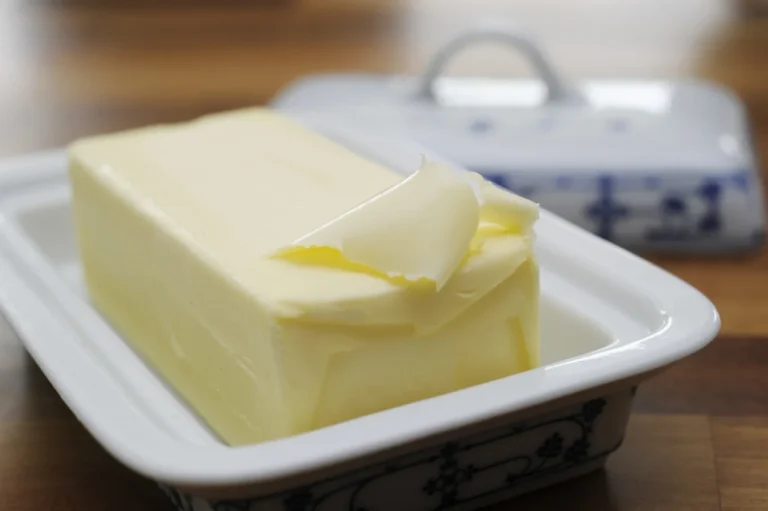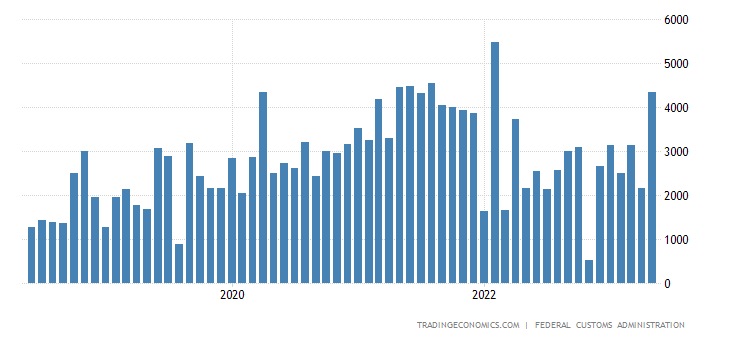Switzerland wants national butter and its trade surplus grows. Meanwhile the EU sabotages agriculture

One of today's economic data of interest concerns Switzerland: today we received the communication of a strong surplus on the Swiss trade balance. Switzerland's trade surplus widened to 4.3 billion Swiss francs in May 2023, from 2.1 billion francs the previous month, revised downwards. This was the largest trade surplus since February 2022, thanks to growing exports and falling imports.
Exports increased by 7.8% to 22.3 billion francs, mainly for chemicals and pharmaceuticals (15.1%), watches (3.8%) and machinery and electronics (0.2%). Among countries, shipments increased in Germany (4.0%), Italy (13.0%), Slovenia (39.1%), China (11.1%) and the United States (7.0%). while they decreased in the United Kingdom (-5.1%), Japan (-3.8%) and France (-5.4%).
Meanwhile, imports decreased by 3.1% to 18.0 billion Swiss francs, in particular those of chemicals and pharmaceuticals (-11.9%), metals (-2.0%) and energy (- 11.8%). Here is the related graph
How does a country with an overvalued currency run a trade surplus? With efficiency, intelligence, and lots and lots of practicality, the one that has been forgotten outside its borders.
Let's take a practical example, which explains the political mountain that divides Europe and Switzerland: in the Swiss parliament a Green deputy made a proposal that goes a bit against what would be the vision of a German or Nordic Green, but which explains very well the Swiss optics. If the domestic market produces enough butter it should not be imported from abroad.
The motion of the Zurich Green, accepted by the majority of the plenum, quickly asks the Confederation to change the authorization conditions for the import of butter: in case of availability within the country, no import from abroad should be permitted. Obviously, in this way the trade surplus increases, and above all, what is missing is imported, not what is produced…
The revenge of the butter
People residing in Switzerland, just over 8 million , consume 5.2 kg of butter per person in a year (data relating to 2021). After the ostracism it has suffered due to the "anti-fat" campaigns, butter is experiencing a second youth. In the EU, the average per capita consumption is 4.2 kg, even though Italy, which prefers olive oil, has a per capita consumption of only 2 kg.
In 2021, Swiss farmers produced 39,700 tonnes of butter: although the demand for butter remains strong or is even increasing, indigenous production is constantly declining every year and is no longer enough to cover the needs of the internal market. This is because the raw material, milk, is mainly used for the production of cheese which has a wider and more protected market than butter.
In fact, also in 2021, the demand for butter in Switzerland was significantly higher than the indigenous production, reaching 45,878 tons. The Federal Office of Agriculture (FOAG) – continues Strebel – has thus increased the 2021 customs quota for the import of butter by 6,100 tonnes.
Quotas and customs duties
What does it mean to increase the tariff quota? Swiss agriculture is strongly protected from foreign competition. To this end, the Confederation uses two particular instruments: customs duties and quotas. Switzerland is a member of the WTO, the World Trade Organization, but the WTO tolerates these two protective measures and Switzerland rightly exploits them.
Every year the Confederation fixes a quota of butter, and in general of dairy products (or even more generally of agricultural products that can be imported into Switzerland during a calendar year.
If you import within these quotas, the customs duties to be paid by the importer are modest if not null. Outside these quotas, the applicable duties (on dairy products there is a minimum duty of 154.4%) are much higher.
“The objective of having decidedly high customs duties – clarifies Michèle Däppen – is to discourage and completely prevent imports”. Just to give an example, adds Reto Strebel, “if you want to import non-quota butter, it costs around 16 francs a kilo (instead of less than six francs). An unsustainable price. Although exorbitant, these duties do not discourage everyone: there is also an out-of-quota import, an Irish butter, for example, sold by a luxury retailer”. If one wants to pay 24 francs, 23 euros, per kg for butter, he can do it very well.
The result of these measures are economic, social and environmental:
- obviously the Swiss trade balance is positive, despite an extremely high cost of living;
- the Swiss agricultural sector and thus the social stability of the country are protected;
- the environment is protected, both by allowing the territorial conservation activity carried out by farmers and by preventing unnecessary imports
Of course, seeing this rule applied by a liberal and mercantilist country is a bit impressive, but this is a practical and empirical approach to economics, which works on a case-by-case basis. We are far from what happens in the EU of inconclusive maximalism, as seen in the services sector, and the results can be seen.

Thanks to our Telegram channel you can stay updated on the publication of new articles from Economic Scenarios.
The article Switzerland wants national butter and its trade surplus grows. Meanwhile the EU sabotages agriculture comes from Scenari Economici .
This is a machine translation of a post published on Scenari Economici at the URL https://scenarieconomici.it/la-svizzera-vuole-il-burro-nazionale-e-il-suo-surplus-commerciale-cresce-nel-frattempo-la-ue-sabota-lagricoltura/ on Tue, 20 Jun 2023 09:00:02 +0000.

